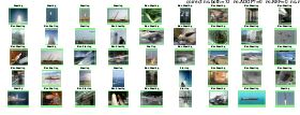Information
- Publication Type: Bachelor Thesis
- Workgroup(s)/Project(s):
- Date: August 2019
- Date (Start): 20. January 2019
- Date (End): 16. August 2019
- Matrikelnummer: 08330864
- First Supervisor: Michael Wimmer
Abstract
In this thesis, we developed an image classification model with improving classification performance over a training phase. The model is using a pre-trained convolutional neuronal network (CNN) for feature extraction and a k-means algorithm for clustering. Performance optimization is realized by optimized weight factors for the extracted feature values. The optimization of the weight factors is calculated iteratively during a training phase. The measure of the weight factor adoption in a training step is related to the ground-truth dependent clustering contribution of the newly added image feature. We see as an advantage of our approach that the optimization requires no internal changes of the applied feature extraction and clustering algorithms, hence pre-trained models or closed-source implementations can be used. As a further advantage, we see the step-wise transparency of the performance development during the training phase for each newly added image as opposed to batch-based training for CNNs. This enables dynamic control of the training phase by the user. Another advantage is the small number of parameters to be optimized, which results in reduced processing time. A further advantage is the classification performance of our model that outperforms the reference model without feature weight optimization. In the course of our work, we developed a Python application that implements our model and provides a user-friendly interface. It allows easy set-up of test cases and provides graphics and tables for a comprehensive evaluation on process steps level. We consider this application as a starting point for future work.Additional Files and Images
Weblinks
No further information available.BibTeX
@bachelorsthesis{Gruber2019,
title = "Extended Image Classification",
author = "Horst Gruber",
year = "2019",
abstract = "In this thesis, we developed an image classification model
with improving classification performance over a training
phase. The model is using a pre-trained convolutional
neuronal network (CNN) for feature extraction and a k-means
algorithm for clustering. Performance optimization is
realized by optimized weight factors for the extracted
feature values. The optimization of the weight factors is
calculated iteratively during a training phase. The measure
of the weight factor adoption in a training step is related
to the ground-truth dependent clustering contribution of the
newly added image feature. We see as an advantage of our
approach that the optimization requires no internal changes
of the applied feature extraction and clustering algorithms,
hence pre-trained models or closed-source implementations
can be used. As a further advantage, we see the step-wise
transparency of the performance development during the
training phase for each newly added image as opposed to
batch-based training for CNNs. This enables dynamic control
of the training phase by the user. Another advantage is the
small number of parameters to be optimized, which results in
reduced processing time. A further advantage is the
classification performance of our model that outperforms the
reference model without feature weight optimization. In the
course of our work, we developed a Python application that
implements our model and provides a user-friendly interface.
It allows easy set-up of test cases and provides graphics
and tables for a comprehensive evaluation on process steps
level. We consider this application as a starting point for
future work.",
month = aug,
address = "Favoritenstrasse 9-11/E193-02, A-1040 Vienna, Austria",
school = "Research Unit of Computer Graphics, Institute of Visual
Computing and Human-Centered Technology, Faculty of
Informatics, TU Wien ",
URL = "https://www.cg.tuwien.ac.at/research/publications/2019/Gruber2019/",
}

 Bachelor Thesis
Bachelor Thesis image
image

